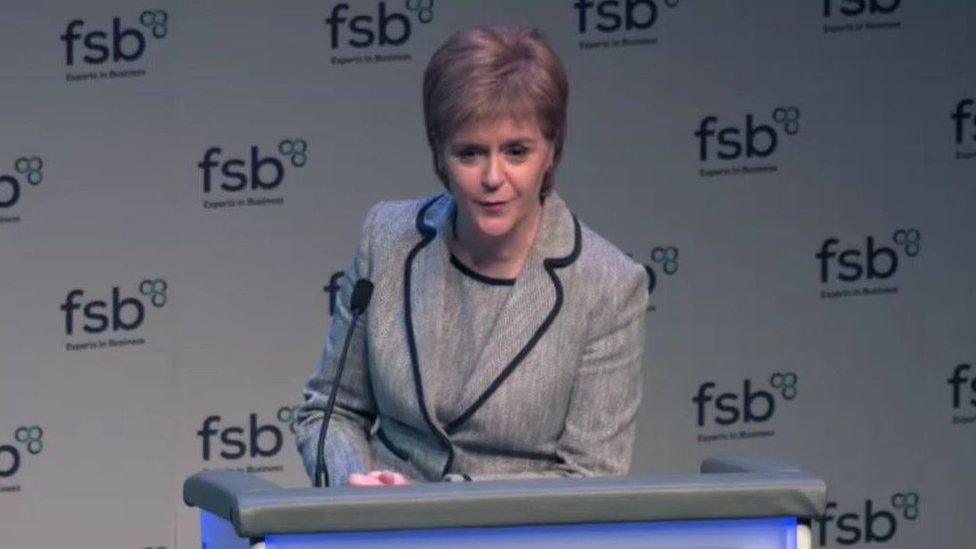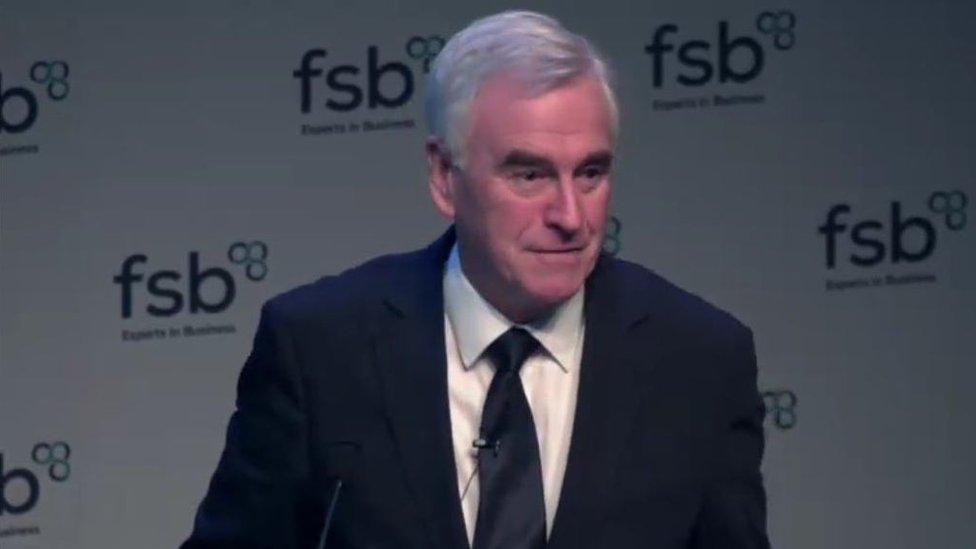Former RBS chief to lead Scottish business rates review
- Published

Ms Sturgeon told the conference that she wanted to make Scotland the best place in the UK to do business
A former chairman of RBS in Scotland, Ken Barclay, is to lead a Scottish government review of business rates.
The announcement was made by First Minister Nicola Sturgeon during a speech to the Federation of Small Businesses (FSB).
The first minister also committed to retaining the small business bonus scheme until at least 2021.
Shadow chancellor John McDonnell and Scottish Tory Ruth Davidson also addressed the conference in Glasgow.
A study by the FSB prior to the conference has found a majority of Scottish firms expect business conditions to worsen.
But Ms Sturgeon told the conference in Glasgow that she wants to make Scotland the "best place to do business anywhere in the UK".
She said Mr Barclay would lead a review considering how business rates might better support growth and respond to wider economic conditions and changing markets.
The review is expected to be complete by the summer of 2017.
'Fair taxation'
Ms Sturgeon said the review, and any action taken by the Scottish government, would be guided by "three clear principles".
"Firstly the intention of the review will be to make recommendations which, overall, are revenue neutral. This is not an exercise in increasing overall tax revenue, it is about ensuring taxation is fair", she said.

Shadow Chancellor John McDonnell also addressed the conference in Glasgow
The first minister added: "Secondly the small business bonus scheme will be retained until at least 2021.
"And finally, the business rates system should reflect the ambition that Scotland will be the best place to do business anywhere in the UK."
Mr Barclay, who left RBS in 2015 after almost 40 years with the bank, said he was "delighted" to take part in the "important piece of work".
The FSB welcomed news of the review, but said some action would need to be taken before it was completed in 2017.
Scottish policy convenor Andy Willox said: "On rates, small firms from up and down Scotland will be pleased to hear of the Scottish government's intentions to review the system while retaining their ground-breaking small business bonus scheme.
"But with just of a year until the next revaluation, action may need to be taken now to make the system more user-friendly."
'Fundamental reform'
The Scottish Retail Consortium also said news of Mr Barclay's appointment was "welcome and positive".
Director David Lonsdale said: "It is encouraging that ministers have listened to the retail industry and the growing chorus from across commercial life in Scotland who have spoken up in favour of fundamental reform of business rates.
"The review heralds a great opportunity to recast business rates for the decades ahead and we look forward to engaging with Mr Barclay and the review to ensure the reformed system is modern, sustainable and competitive."

The federation said pressures on the services sector were taking their toll
Shadow Chancellor John McDonnell addressed the conference after Ms Sturgeon, saying Labour wanted to work "closely" with the FSB on a "joint agenda".
Describing small businesses as "the engines of our prosperity", he said it would be them and not politicians who would turn around the country's economic fortunes.
Scottish Conservative leader Ruth Davidson also made a speech, pledging to be "a voice for small business" at Holyrood, and calling for a business rate freeze across Scotland.
She said rates were "a huge dead weight on the ability of business to prosper", calling on the Scottish government to "go further" on the matter than the UK government.
Before the conference, the FSB released a quarterly survey showing a majority of small Scottish firms expect business conditions to worsen.
'Gruelling conditions'
It said business owners in Scotland were among the gloomiest in the UK, with a majority pessimistic for the first time since 2013.
Some 64% of respondents saw the state of the domestic economy as a barrier to their business growth. Confidence among firms in the UK also hit its lowest level in three years.
The survey suggested that small business revenues and profits north of the border were down, although firms predicted improvements.
Mr Willox said: "Scottish firms whose prospects are indirectly or directly allied with the state of the oil and gas industry are of course facing gruelling trading conditions.
"But the pressures on the massive services sector are also taking their toll. This could explain why Scottish confidence figures lag behind even the depressed numbers for the UK as a whole."
- Published10 March 2016

- Published2 March 2016

- Published16 December 2015

- Published29 June 2015
